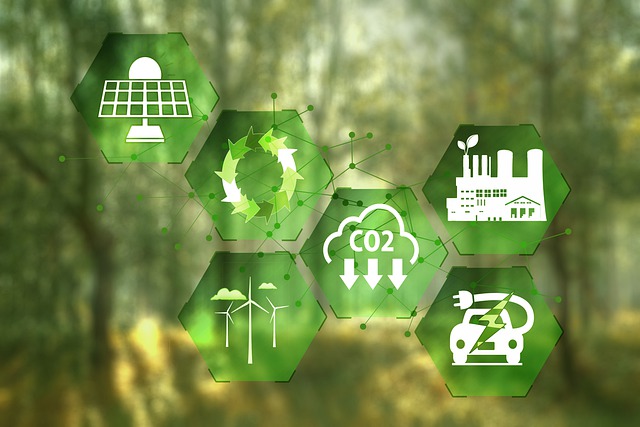The excessive use of fossil fuels to produce energy has led to the consequent rise of CO2 levels. As these levels are increasing, new actions have to be taken to lower CO2 emissions and achieve the so-called decarbonization.
What is decarbonization and why does it matter?
Carbon dioxide (CO2) is a greenhouse gas that is indispensable for plants since they use it for photosynthesis, which means that life on Earth would be impossible without it. As a result of human activity, the levels of CO2 in the atmosphere have increased to the extent that, some years ago, it was agreed by 197 countries that CO2 emissions must be reduced to reach net carbon neutrality by 2050. This practice was named decarbonization– for it intends to decarbonize the atmosphere-, and to achieve this, it would be necessary to switch from fossil fuels to renewables and low carbon energy sources.
Europe’s commitment to decarbonization
Image by Gerd Altmann in Pixabay
The EU intends to reach net-zero greenhouse gas emissions by 2050 and become climate-neutral. This objective is part of the European Green Deal and it involves all parts of society and all economic sectors. In addition, this goal is in line with the Paris Agreement, which was signed with the objective of keeping the global temperature below 2ºC. By investing in technological solutions and taking action in key areas- such as finance and research- the EU can lead the way towards decarbonization, as it is committed to a 55% reduction in greenhouse gas emissions by 2030 in contrast to 1990 levels. In this way, the EU’s long-term goal is to become the first climate-neutral continent, but how can it achieve this ambitious objective?
Funds focused on decarbonization
Where there’s a will, there’s a way; but to reach net-zero greenhouse gas emissions and lower the temperature of the planet, collaborative efforts are needed. A number of funds have been created to foster decarbonization not only in Europe but also worldwide.
Innovation Fund (EC)
The Innovation Fund was launched by the European Commission to support the EU’s independence from Russian fossil fuels. To strengthen this fund, the amount for the next large-scale call will be doubled and will rise to €3 billion. This fund is expected to provide around €10 billion during the period of 2020-2030 to support the commercialisation of new low-carbon technologies. This way, it intends to bring to the market industrial solutions to decarbonize Europe and contribute to its transition towards a climate neutrality, and as such, it will focus on highly innovative technologies; big flagship projects; innovative low-carbon solutions; and small-scale projects bringing on significant emission reductions.
Breakthrough Energy
In line with the 2050 goal, Bill Gates launched Breakthrough energy, a fund that seeks disruptive technologies that can provide the world with clean, affordable and reliable energy. To achieve this, the fund invests in research and development and intends to create a demand for clean technologies by supporting environmentally friendly choices across all Five Grand Challenges: manufacturing (how we make things), electricity (how we plug in), agriculture (how we grow things), transportation (how we get around), buildings (how we live).
Just Climate
Just Climate is a company created with the objective of helping to reach net-zero greenhouse gas emissions in 30 years, and whose mission is also to limit global temperature rises to 1.5ºC. This way, it invests in projects and companies across energy, transport, industry, buildings, food, agriculture and other sectors.
Just Climate focuses on three main objectives: Generate quantifiable, authentic, at-scale impact; de-risk transition assets and mobilize further capital; and set a new standard for climate-led investing. The firm is chaired by the former Vice President Al Gore, and it is backed by Microsoft, Ireland’s sovereign fund and a foundation linked to Ikea.
Why decarbonization is important
Even if climate matters can come as a cliché, their importance is real, and thus, action needs to be taken. Maybe many years ago humans did not understand the dangers of CO2 emissions, but nowadays we are more than aware of this fact, and we have the tools and the knowledge needed to change the situation. Decarbonization is both an urgent challenge and an opportunity to walk towards a more sustainable future for all.






